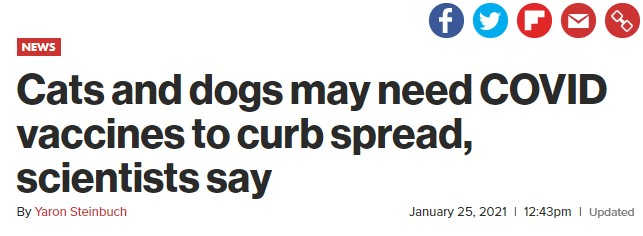Scientists from the University of East Anglia and the Earlham Institute, both in the UK, and the University of Minnesota have expressed that cats and dogs may eventually need to be vaccinated against Covid-19 after all. This is to help stem the spread of the virus back to people. Although cases of pets to human transmission are rare, they say that it might subsequently pose a risk to public health, due to the continuous evolution of the virus on animals. At the moment, there are still no Covid-19 vaccines developed for these house pets. However, research and development for vaccines for minks are ongoing due to the massive spread of the virus on mink farms last year.

New York Post: “SARS-CoV-2 can infect a wide range of host species, including cats, dogs, mink and other wild and domesticated species and, hence, the vaccination of domesticated animals might be required to halt further virus evolution and spillback events.”

The New York Post shares that according to scientists, cats and dogs may also need to be vaccinated against COVID-19 to help stunt the spread of the infectious disease — amid a threat of the “continued evolution of the virus in animals.
While there are no known cases in which a human contracted COVID-19 from a furry family member, Cock van Oosterhout, a professor of evolutionary genetics at UEA in Norwich, said we should prepare “for any eventuality.”
Last year, Denmark was forced to cull millions of mink after hundreds of coronavirus cases in the country were linked to the farmed critters.
If this were to happen with cats and dogs, it would pose “a significant long-term risk to public health,” the editorial warned.
Live Science: Eventually, pets may need their own COVID-19 vaccines to prevent the coronavirus from evolving further

According to Live Science, SARS-CoV-2, the virus that causes COVID-19, is known to infect a number of animals besides humans, including cats, dogs, minks, tigers and gorillas.
The authors of a new editorial, published Jan. 25 in the journal Virulence, say that these animal “reservoirs” may pose a risk to humans down the road, because there is the potential for the virus to evolve in those species and spread back to people.
However, the authors are not calling for vaccinating dogs and cats against COVID-19 right now, but instead proposing the idea to be considered in the future.








